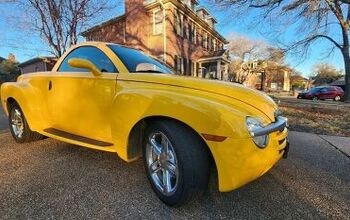Does It Have to Be Said? Getting Hit by an SUV Is Worse Than Getting Hit by a Car, Study Finds

From the “No Shit” files comes a new study from the Insurance Institute for Highway Safety. In it, researchers reach an obvious conclusion that should surprise no one: tall, blunt-faced vehicles are far more likely to damage your sensitive, delicate body than low-riding passenger cars.
Pick that jaw up off the floor.
Analyzing car-pedestrian collisions from three Michigan cities, the takeaway was clear. That marauding Lexus LX 470 is far more likely to do damage to your internal organs (and the bits and piece surrounding them) than, say, a 2008 Honda Civic.
From the IIHS:
In the Michigan crashes, SUVs caused more serious injuries than cars when impacts occurred at greater than 19 miles per hour. At speeds of 20-39 mph, 3 out of 10 crashes with SUVs (30 percent) resulted in a pedestrian fatality, compared with 5 out of 22 for cars (23 percent). At 40 mph and higher, all three crashes with SUVs killed the pedestrian (100 percent), compared with 7 out of 13 crashes involving cars (54 percent). Below 20 miles per hour there was little difference between the outcomes, with pedestrians struck by either vehicle type tending to sustain minor injuries.
Seems pretty clear-cut and obvious, though with only 79 collisions from one geographic area under the microscope, researchers say they’ll need a wider study to show just how prevalent the phenomenon is.
While traffic fatalities are on the decline — passive safety systems and a reduction in drunk driving have seen roadway deaths fall significantly since the 1980s, despite more miles driven — pedestrian fatalities are up. This cohort now makes up one fifth of all traffic fatalities. Vehicle design and the skyrocketing popularity of high-riding SUVs, trucks, and crossovers over the past decade could explain that.
“Although pedestrian crashes most frequently involved cars, fatal single-vehicle crashes involving SUVs striking pedestrians increased 81 percent from 2009 to 2016, more than any other type of vehicle,” the IIHS stated.
The taller face put forward by SUVs means pedestrians are more likely to sustain thigh and hip damage, as well as be thrown forward, instead of upward. That said, most crossovers these days bear no resemblance to the brick-like International Harvester Scouts of long ago. Lowered bumpers, sloping fronts, and impact-absorbing hoods are a thing. And many crossovers are only that in name only. The same cannot be said for full-size pickups.
“IIHS plans to use the Michigan crash data to look into what kind of SUV profile poses the least risk to struck pedestrians,” the institute said.
[Image: Corey Lewis/TTAC]

More by Steph Willems
Latest Car Reviews
Read moreLatest Product Reviews
Read moreRecent Comments
- 28-Cars-Later I'm not sure when it was shot, but I noticed most shots featuring a Ford are pushing the BEV models which haven't sold well and financially kicked the wind out of them. is it possible they still don't get it in Dearborn, despite statements made about hybrids etc.?
- ToolGuy I watched the video. Not sure those are real people.
- ToolGuy "This car does mean a lot to me, so I care more about it going to a good home than I do about the final sale price."• This is exactly what my new vehicle dealership says.
- Redapple2 4 Keys to a Safe, Modern, Prosperous Society1 Cheap Energy2 Meritocracy. The best person gets the job. Regardless.3 Free Speech. Fair and strong press.4 Law and Order. Do a crime. Get punished.One large group is damaging the above 4. The other party holds them as key. You are Iran or Zimbabwe without them.
- Alan Where's Earnest? TX? NM? AR? Must be a new Tesla plant the Earnest plant.


































Comments
Join the conversation
Maybe this study will allow cars to have proper front ends again instead of tall "pedestrian safety" front ends.
Here's a thought experiment: What if we could buy *any* car we wanted but it was taxed on a sociopathy scale. Cars would be scored on lethality to others, lethality to occupants, fuel consumption, emissions, active and passive collision avoidance, etc. with sliding tax rates for each. Buy something with a low total score, get a fat tax rebate. Buy something with a high total score, pay a big tax penalty on it. In this way you have a free market that sends accurate price signals by correcting for externalities. You maximize both freedom of choice and benefit across society. It would never work because the first "pro-business" administration elected would totally corrupt it, but in a perfect world it's a nicer alternative to command and control regulation, and it might ease up the arms race of buying a Tahoe so that your neighbor's Tahoe doesn't kill your kids.